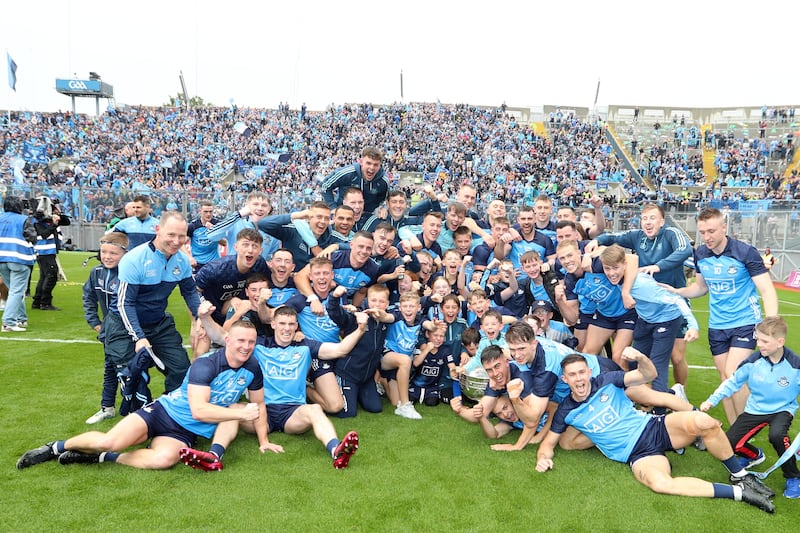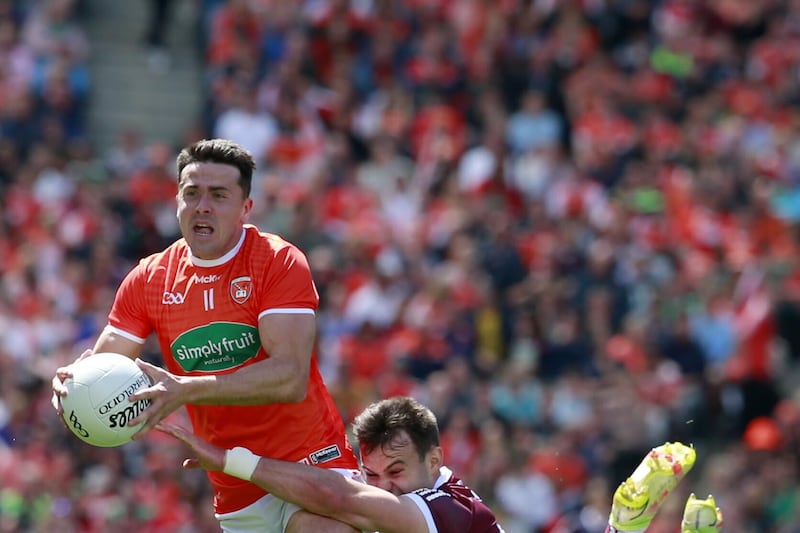“I am the man the man that won the All Ireland football final of 1942 as captain of the Dublin team.”
Joe Fitzgerald, in a letter to Michael Anderson
HUNDREDS of thousands have played the game, but only 111 men know how it feels to captain their county to the All-Ireland Senior Football Championship.
Back in the late 1990s, GAA historian Michael Anderson began a project to track down those men and collect the autographs of all the living All-Ireland-winning football captains. What he has come up with is a unique treasure trove that features some of the greats of the game.
“We went across the border into Armagh and trained in Clonmore” - Aidan McCrory reveals how Ulster camaraderie helped Tyrone champions Errigal Ciaran reach All-Ireland final
‘We make sure we die with the boots on’ - fighting spirit has seen Errigal Ciaran through so many close encounters says Peter Harte
Flick through the pages of his collection and Kevin Heffernan is followed by Mick O’Connell who is followed by Down’s Kevin Mussen and Paddy Doherty and so it goes on through Paidi O Se and Dinny Allen, DJ Kane, Henry Downey, Anthony Molloy, Kieran McGeeney and Peter Canavan.
With one high profile exception, Michael has been successful so far and many of the replies he received – from Dublin’s Joe Fitzgerald to Kerry’s Fionn Fitzgerald – include letters, pictures and poems that encapsulate all that is best about the GAA.
Kerry born Joe Fitzgerald - who made that celebrated ascent up the Hogan Stand steps to receive the Sam Maguire after the Dubs had beaten Galway back in 1942 – is the oldest signatory in Michael’s collection.
Ulster’s first ever breakthrough came five years’ later when Cavan won the Sam Maguire for the first time. Sadly the skipper that day John Joe O'Reilly passed away in 1952 so Mick Higgins, captain of the side that had captured Cavan’s third title just a month previously, is the first Ulster signatory.
“I never kept official programmes,” wrote the Mountnugent clubman, who passed away in 2010, back in 1999.
“It is only now that I am sorry I ever kept any of them.”
In 1953, Armagh made their first appearance in an All-Ireland final but were beaten by Kerry in the decider. The Kingdom’s win meant that their skipper James ‘Jas’ Murphy is included in the album at the expense of Orchard captain Sean Quinn.
Former Kerin’s O’Rahilly’s clubman Murphy had relocated to Cork by 1999 when he replied to Michael’s request for an autograph.
“It’s great for one of the ‘has beens’ to get a remembrance after all these years,” he wrote.
“It brings back happy memories, especially for me being captain of the ’53 winning All-Ireland Kerry team. I still take an interest in the GAA being a member of Nemo Rangers and having been elected president of the club this year (1999).
“Also in the club are two previous All-Ireland winning captains – Billy Morgan (’73) and Dinny Allen (1989).”
Peter McDermott was the referee in 1953 and had already played in three All-Ireland finals (1951 and ’52, a draw and replay) before he got the chance to skip up the Hogan steps and collect the Sam Maguire on behalf of Meath in 1954.
McDermott, AKA ‘The man in the cap’, had an extraordinary career and he was also the referee in the 1956 final.
“I never expected to be asked for an interview at this time of my life and it is most flattering,” wrote Peter, adding: “I am afraid I cannot help you as regards programmes, all my medals and mementoes were stolen in a burglary many years ago.”
‘The man in the cap’ was part of the Down coaching staff four years later when Kevin Mussen was carried up the Hogan Stand steps on a wave of cheers from the entire six counties after he became the first man from north of the border to raise the Sam Maguire.
A year later, Paddy Doherty made the same journey after the Mournemen defended their crown. However, for Doherty, that first victory was the sweetest.
“You must have seen that won the first All-Ireland,” he wrote.
“The first is always the best.”
Joe Lennon, from Michael’s own club Aghaderg, was the third Down skipper in the decade to hold the Sam Maguire aloft. Over 30 years on, he recalled his formative days in Down football
“Although the time has flown since my days with Aghaderg, I cherish the memory of them,” wrote three-time All-Ireland winner Lennon, who passed away in 2016.
“The people, the games, the atmosphere and particularly the ethos has changed a lot.”
The black and white of the sixties gave way to the technicolour age of the 1970s and Donie O’Sullivan was the skipper as Kerry’s green and gold held sway at the start of the decade. The Tralee native has his cherished medal and his memories from that September Sunday, but not a lot else.
“Unfortunately I didn’t hold onto old programmes and memorabilia and, of course, as the years go by these become more interesting,” he wrote.
“It is said that youth is wasted on the young – it certainly applied to us in footballing days.”
Offaly and Dublin shared five titles between them, but by the end of the decade Kerry hands were back on the Sam Maguire. The signature of Ogie Moran (1978) is followed by Tim Kennelly, Ger Power and Jinmy Deenihan.
“Your collection is an important social commentary,” wrote Finuge clubman Deenihan.
“The GAA, more than any other sporting organization, represents the real spirit of Ireland.”
Kerry’s five in-a-row dreams were shattered the following year thanks to Seamus Darby’s famous goal for Offaly. The Faithful county skipper that day was Richie Connor who wrote: “I wish you every success with your endeavours.
“A daunting task indeed!”
The late, great Paidi O Se features in 1985 and four years later - after Kerry’s Ambrose O’Donovan and Tommy Doyle and Meath’s Mick Lyons and Joe Cassells – comes the man O Se had a famous altercation with.
Cork’s Dinny Allen had cracked the Ventry legend’s jaw with the business end of his elbow during a bad-tempered flashpoint in the all-Munster rivalry before the Kerry man felled him with a thunderous left hook.
“I am obviously delighted to sign this for you,” wrote the Nemo Rangers clubman who captained the Rebels to glory in 1989.
“It’s nice to know there are people like you so interested in sport.”
He signed off with: “Wishing Down “nearly” all the best in the All-Ireland Championships.”
Despite his good wishes Down have been unable to recapture the success of the 1960s and 1990s but three years later, their Ulster neighbours Donegal broke new ground when they beat Dublin by four points to win the 1992 All-Ireland title. The Tir Chonaill skipper that day was Ardara clubman Anthony Molloy.
“I miss playing the game as nothing will ever substitute for togging out and representing your club or county,” said Molloy.
“’92 was a great year for Donegal.
“I suppose being fortunate enough to be captain at the time really put the icing on the cake. Walking up the steps of the Hogan Stand is a wonderful feeling, one that I will always cherish and be thankful for – to be there and be part of that great team.”
Derry (Henry Downey) and Down (DJ (Damian) Kane) continued the Ulster dominance in the early 1990s. It was a very competitive decade with eight different counties winning Gaelic football’s ultimate prize including Galway’s Liam Silke who collected the silverware in 1998.
“Best of luck with your signature collecting from all the Galway team,” he wrote.
“We hope to keep Sam in west in 1999 DV.”
Silke added: “Down did brilliantly in 1991 and 1994.
“I worked with Patsy O’Hagan for a few years. He was number five in 1960 and number 14 in 1961.”
Clonduff native O’Hagan’s grandson Danny Cummins is a present day star for Galway.
Unfortunately for Silke and the Tribesmen, his wish for 1999 didn’t come true and Meath – skippered by Graham Geraghty – took the final title of the millennium.
The Royals had beaten Ulster champions Armagh at the All-Ireland semi-final stage and Kerry and Galway did likewise over the next two seasons until the Orchardmen finally made the breakthrough they deserved in 2002.
“I hope you are looking for this signature at the end of the year as well!” wrote Armagh skipper Kieran McGeeney.
McGeeney and Armagh were back at Croke Park in 2003, but it was their neighbours Tyrone who lifted the Sam Maguire (their first) so skipper Peter Canavan became the first Red Hand to add his name to Michael Anderson’s collection.
Brian Dooher appears twice before the end of the decade and before Dublin began their era of dominance which continues to this day.
Bryan Cullen, the skipper in the Dubs’ breakthrough year of 2011, wrote: “Delighted to add to your collection” with his autograph. A year later, Michael Murphy’s name features after Donegal’s famous win and Kerry’s Fionn Fitzgerald is the last entry in the album.
The combative Kerry defender wrote: “It is with great pleasure that I pen this reply.
“Getting to climb the steps of the Hogan Stand was a special day for myself and co-captain Kieran (O’Leary).
“Getting to play an All-Ireland final with Kerry was incredible but getting to lead Kerry out on this special day was a dream come true. It is something I hope I can reflect more on when I retire – I’m only 24 so hopefully it won’t be for a long time.
“The chance to replicate the day drives me on.”
Sadly, the page marked 2013 and the last three - 2015, 2016 and 2017 - remain blank. Michael has written to Stephen Cluxton more than once, but the Dublin skipper has yet to reply.
“Most people are just happy to be asked,” said Michael.
“Some of them said they were delighted and honoured and wished me all the best with the collection. It’s a nice story when you read through them.
“Stephen Cluxton is the only refusal and the unfortunate thing is that he has been captain four times so I’m missing four. I have written to him two or three times and I wrote to Jim Galvin as well but I got nothing back.”
Is Cluxton’s refusal a sign of changing times in the GAA? Surely not.
If he knew how much his signature would mean and the hallowed company it would put him among he’d reply, wouldn’t he? You’d like to think so anyway.






